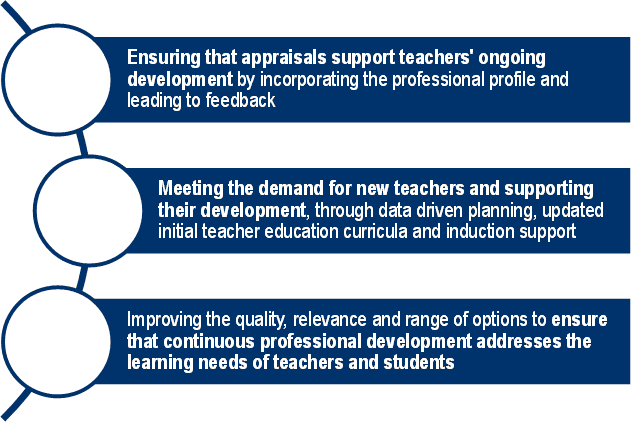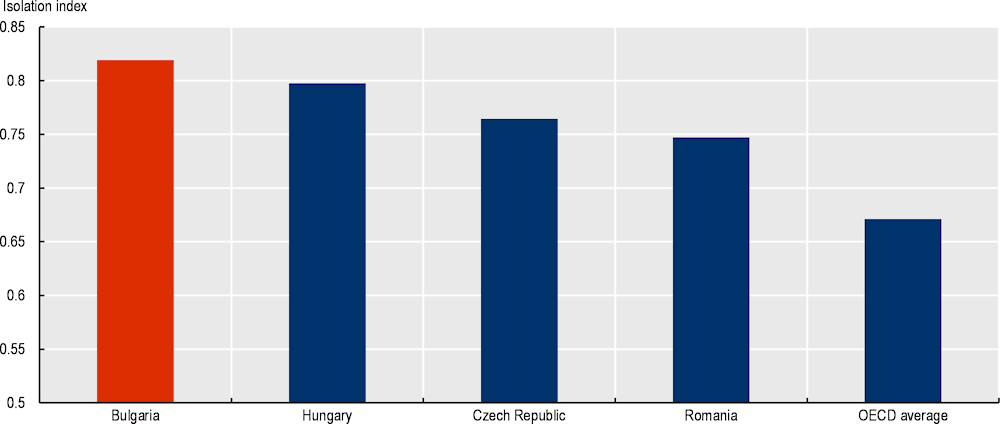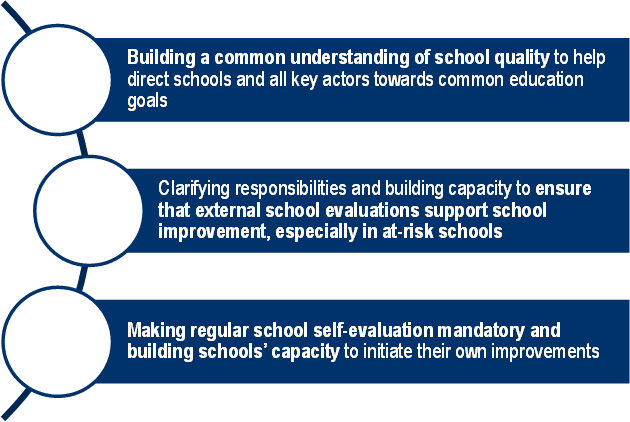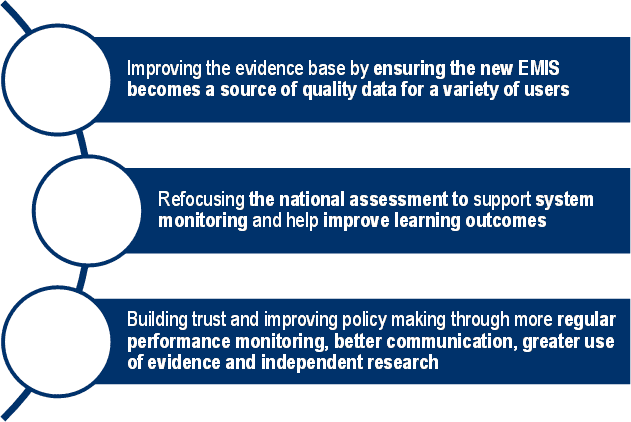[5] EC (2020), Education and Training Monitor 2020: Bulgaria, European Commission, https://op.europa.eu/en/publication-detail/-/publication/0b2b116f-2499-11eb-9d7e-01aa75ed71a1/language-en/format-PDF/source-171315948 (accessed on 24 February 2021).
[8] EC (2018), “Tracking school dropouts in Bulgaria”, ESPN Flash Report, Vol. 2018/30, https://ec.europa.eu/social/BlobServlet?docId=19725&langId=en (accessed on 31 August 2021).
[16] Eurostat (2021), Classroom Teachers and Academic Staff by Education Level, Programme Orientation, Sex and Age Groups [educ_uoe_perp01], https://ec.europa.eu/eurostat/data/database (accessed on 20 July 2021).
[4] Eurostat (n.d.), Eurostat Database, https://ec.europa.eu/eurostat/data/database (accessed on 23 February 2021).
[3] Fileva, L. (2021), “Education policies: New funding for schools and fewer textbooks per subject [ Политиките за образованието: ново финансиране за училищата и по-малко учебници по предмет]”, Dnevnik [Дневник], https://www.dnevnik.bg/bulgaria/2021/12/15/4293494_politikite_za_obrazovanieto_novo_finansirane_za/.
[13] IEA (2020), TIMSS 2019 International Results in Mathematics and Science, TIMSS & PIRLS International Study Center, Lynch School of Education and Human Development, Boston College and International Association for the Evaluation of Educational Achievement.
[12] IEA (2017), PIRLS 2016: International Results in Reading, TIMSS & PIRLS International Study Center, Lynch School of Education, Boston College and International Association for the Evaluation of Educational Achievement, http://pirls2016.org/wp-content/uploads/structure/CompletePDF/P16-PIRLS-International-Results-in-Reading.pdf (accessed on 24 February 2021).
[27] Maghnouj, S. et al. (2020), OECD Reviews of Evaluation and Assessment in Education: Serbia, OECD Reviews of Evaluation and Assessment in Education, OECD Publishing, Paris, https://doi.org/10.1787/225350d9-en.
[21] Ministry of Education and Science (2021), “Replies to additional questions after mission two”, Ministry of Education and Science of Bulgaria, Sofia.
[19] Ministry of Finance (2020), Vision, Goals and Priorities of the National Development Programme Bulgaria 2030, https://www.minfin.bg/en/1394.
[9] NSI (2020), Students and Drop-outs: Reasons and Level of Education, National Statistical Institute, Bulgarian, https://nsi.bg/en/content/3435/students-and-drop-outs-reasons-and-level-education.
[26] NSI (n.d.), Students and Drop-outs by Reasons and Level of Education, National Statistical Institute, https://www.nsi.bg/en/content/3435/students-and-drop-outs-reasons-and-level-education (accessed on 4 November 2021).
[1] OECD (2021), Decentralisation and Regionalisation in Bulgaria: Towards Balanced Regional Development, OECD Multi-level Governance Studies, OECD Publishing, Paris, https://dx.doi.org/10.1787/b5ab8109-en.
[2] OECD (2021), OECD Economic Surveys: Bulgaria 2021: Economic Assessment, OECD Publishing, Paris, https://dx.doi.org/10.1787/1fe2940d-en.
[20] OECD (2021), “PISA: Programme for International Student Assessment”, OECD Education Statistics (database), https://doi.org/10.1787/data-00365-en (accessed on 2 December 2021).
[6] OECD (2020), Early Learning Matters, OECD, Paris, https://www.oecd.org/education/school/Early-Learning-Matters-Project-Brochure.pdf.
[15] OECD (2020), “Learning remotely when schools close: How well are students and schools prepared? Insights from PISA”, OECD Policy Responses to Coronavirus (COVID-19), OECD Publishing, Paris, https://dx.doi.org/10.1787/3bfda1f7-en.
[23] OECD (2020), PISA 2018 Results (Volume V): Effective Policies, Successful Schools, PISA, OECD Publishing, Paris, https://dx.doi.org/10.1787/ca768d40-en.
[10] OECD (2019), PISA 2018 Results (Volume I): What Students Know and Can Do, PISA, OECD Publishing, Paris, https://dx.doi.org/10.1787/5f07c754-en.
[22] OECD (2019), “Isolation of disadvantaged students from high-achieving students in reading”, in PISA 2018 Results (Volume II): Where All Students Can Succeed, PISA, OECD Publishing, Paris, https://dx.doi.org/10.1787/b5fd1b8f-en.
[14] OECD (2019), PISA 2018 Results (Volume III): What School Life Means for Students’ Lives, PISA, OECD Publishing, Paris, https://dx.doi.org/10.1787/acd78851-en.
[11] OECD (2019), TALIS 2018 Results (Volume I): Teachers and School Leaders as Lifelong Learners, TALIS, OECD Publishing, Paris, https://dx.doi.org/10.1787/1d0bc92a-en.
[24] OECD (2013), Synergies for Better Learning: An International Perspective on Evaluation and Assessment, OECD Reviews of Evaluation and Assessment in Education, OECD Publishing, Paris, https://doi.org/10.1787/9789264190658-en.
[25] OECD (2013), Synergies for Better Learning: An International Perspective on Evaluation and Assessment, OECD Reviews of Evaluation and Assessment in Education, OECD Publishing, Paris, https://doi.org/10.1787/9789264190658-en.
[17] Republic of Bulgaria (2019), Bulgaria 2030: Part 1 Analysis of the Socio-economic Development of the Country After its Accession to the EU, https://www.minfin.bg/upload/41549/Bulgaria%202030%20analiz.pdf.
[7] UIS (2018), UIS.Stat, UNESCO Institute for Statistics, http://data.uis.unesco.org/ (accessed on 4 February 2021).
[18] UNESCO (2020), “Rapid assessment of COVID-19 impact on education in Bulgaria”, https://www.unicef.org/eca/rapid-assessment-covid-19-impact-education-bulgaria.









